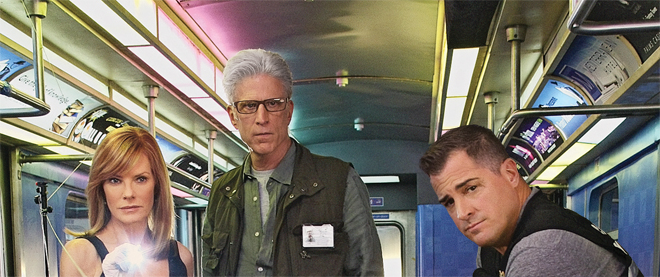Why old people are suddenly watchable on TV
Networks are discovering their most loyal viewers like over-60s like Ted Danson
Photo by Robert Voets/CBS via Getty Images
Share

When Ted Danson was chosen as the new lead on CSI, the surprising thing wasn’t that a comedy actor (Cheers) was going to star in TV’s most famous gory forensic mystery. What stunned people was that a major U.S. show will have a hero who’s over 60. Danson, who was born in 1947 and has been bald since his sitcom days, had been playing character parts on shows like HBO’s Bored to Death. That’s what older actors usually do in television, where advertisers care mostly about reaching young viewers. But Bill Newcott, entertainment editor for the American Association of Retired Persons magazine, told Maclean’s there’s an increased awareness that “the longer the star has been out there, the more comfortable we are with them.” Older people are in.
Mark Harmon, who will turn 60 this year, is the star of the most-watched show on television, NCIS. Larry David is 64 and getting some of his best ratings on Curb Your Enthusiasm. And the recently announced Emmy nominees included 63-year-old Kathy Bates, whose Harry’s Law was one of the few successful new shows last season, and Betty White, who now specializes in jokes about her advanced age.
What’s causing this influx of people who are 60 and up? It may help that reality TV, which always seems to influence its scripted cousin, has been proving that you don’t need youth to get young people watching. American Idol has almost matched the success of the Simon Cowell years thanks to Steven Tyler, a man in his 60s who gets flirty with young contestants; he has completely overshadowed Jennifer Lopez, who is 20 years younger but much less popular with her own age cohort.
Even if a network signs up an older actor and finds that young people won’t watch him, old people will—and TV networks are now more conscious that people nearing retirement age are their best customers. Bill Carter and Tanzina Vega reported in the New York Times that U.S. networks are trying to sell advertisers on the idea that “older people aren’t so bad after all.” Media Week reported that Alan Wurtzel, president of research for NBC, coined the term “Alpha Boomers” to describe a group of people over 55 who “respond to advertising.”
Of course, since young people are drifting toward other forms of entertainment, it’s natural that networks would argue for the value of the viewers they still have. Middle-aged and elderly people are loyal to television, not only because they’re not big users of online streaming but because, Newcott says, “They’re comfortable staying in for their entertainment. They don’t feel that they need to be out to consume it.” That presents new opportunities for actors like Danson or Bates to lead ensemble casts. Many if not most of the actors on these shows are young and pretty, but the older, wiser person gets to boss them around and lecture them on their mistakes. That offers some wish-fulfillment for all ages.
There are potential disadvantages to this kind of TV, though. Historically, shows about old protagonists have gotten a reputation for being old-fashioned or even reactionary: as The Simpsons joked, Andy Griffith in Matlock was “the man who puts young people in jail where they belong.” If Danson makes CSI into the story of an old guy who teaches young people how to live, it won’t be very popular. Newcott says the best shows of this type have “give and take among the generations. The young kids are learning things procedurally from the older characters, but the older character is enriched by his experience with the young people.”
Besides, as long as they’re not portrayed as being completely superior to young people, older actors can bring a sense of authority that young performers don’t always project. A major weakness of Hawaii Five-0 is often considered to be the lead, Alex O’Loughlin, who’s young and handsome and so bland you can barely understand why the rest of his team would listen to him. Danson, unlike O’Loughlin and other whippersnappers, might at least get those alpha boomers watching. And unlike their children, they’re watching the commercials, too.